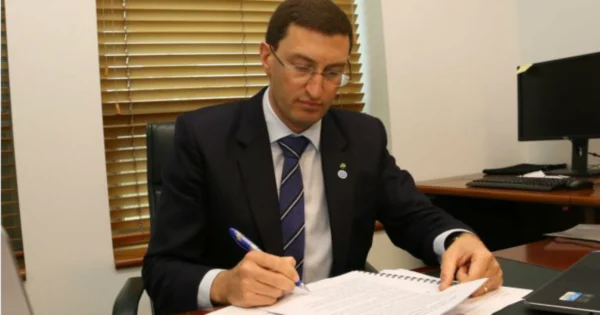6 MARCH 2023
FEDERATION CHAMBER
I want to thank the members for McNamara and Wentworth for moving this motion. With the two
of them I am pleased to be one of the three co-chairs of the Parliamentary friends of the
International Holocaust Remembrance Alliance.
I also want to acknowledge the work of the Executive Council of Australian Jewry led by President
Jillian Segal and CEOS Peter Wertheim and Alex Ryvchin
The ECAJ monitors instances of racial hatred and racial abuse directed at the Jewish community.
For ten years Julie Nathan has produced the ECAJ’s annual report on Antisemitism in Australia
The 2022 report found that anti-Semitic incidents had increased by more than 40 per cent over the
last two years.
Many of those incidents involved the growth in politically motivated extremism from neo-Nazi
groups like the National Socialist Network and the European Australian Movement.
To quote from the report:
Ostensibly left-leaning, progressive groups, including so-called “anti-racism activists”, are
mainstreaming antisemitism and/or actively undermining the fight against antisemitism.
Some perceive Jews as wealthy and powerful, and therefore excuse any attacks on Jews as
“punching-up”, and not as racism. Some ignore anti-Israel discourse which crosses the line
into hateful conceptualisations of Jews.”
In 2019 David Badiel a British author on the political left wrote a book called Jews Don’t Count.
His book chronicles the blind eye that is turned to antisemitism on the left and the double standard
of progressives in excluding and minimising anti-Semitism as a form of racism.
Most often, it is hidden behind double standards and a demonisation of the state of Israel.
In 2019, Australia became the 33rd member of the International Holocaust Remembrance Alliance.
I am proud that Australia has joined this international movement.
This union of nations underscores the importance of confronting evil and in educating the next
generation of Australians.
The Parliamentary Friends of IHRA is encouraging the adoption of the IHRA definition of
antisemitism in all aspects of government and acknowledged by institutions across the public and
private sector.
That definition of anti-Semitism includes examples such as:
• Making mendacious, dehumanizing, demonizing, or stereotypical allegations about Jews
• Accusing Jewish citizens of being more loyal to Israel…than to the interests of their own
nations, and
• Holding Jews collectively responsible for actions of the state of Israel.
Sadly, today the epicentre of anti-Semitic activity is our universities.
The situation on campus for Jewish students is particularly bad.
In 2022, SRCs at Sydney, Melbourne, ANU Adelaide and Wollongong Universities passed motions
supporting the anti-Semitic Boycott Divestment and Sanctions movement.
At Sydney University when Jewish students spoke out against the motion they were shouted down.
At Adelaide University, the student publication On Dit published multiple articles calling for the
‘death to Israel’ and ‘glory to the intifada, may it be merciless’.
Jewish students expressed concern to the University and were told that this is a ‘student issue’, and
one student was told that they are just “more sensitive” because they are Jewish.
At the SRC meeting at Adelaide University, there was a motion put forward condemning the On Dit
article. Jewish students attended the meeting to express their concerns. They were not treated with
respect instead several students shouted them down with the words “death to Israel”
In response on social media, Jewish students were accused on old anti-Semitic tropes of divided
loyalties creating, and I quote “an unnecessary holocaust industry” and having sinister money,
power and influence.
At QUT an academic posted comments on his Facebook in respect to a student that included
references to “Nazi Jews” and “Your lies and propaganda make you even more hated in the world.”
Those examples, which are by no means an exhaustive list of disturbing anti-Semitic incidents is the
reason why the first step of the parliamentary friends of IHRA has been to write to all university
vice chancellors encouraging them to adopt the IHRA definition.
Already Melbourne University has agreed to adopt the definition. I commend and thank Melbourne
University and we are calling on other universities to follow suit.
I was on university campus in the 1990s and while there was some anti-Semitic sentiment then it was
a minority view.
You could be publicly Jewish on campus and feel a sense of belonging.
All that has changed now.
As the national President of the Australasian Union of Jewish Students Alissa Foster told me
“Many students don’t feel safe being identifiably Jewish on campus, and part of that is
because our experiences of antisemitism aren’t yet recognised by our Universities. Adopting
the IHRA definition is not only a way for University’s to show their Jewish students that
they are listening but it’s a way for them to tangibly work with us to address these
concerns.”
Alissa Foster is right, Jewish students should not have to put up with this sort of behaviour on
campus.
All too often, universities speak the words of diversity, inclusion and acceptance, but don’t live it.
When confronted by their failure, these same Universities repeatedly hide behind banal bureaucratic
language.
There should be no place for anti-Semitism on Australian campuses. It is time for Australian
universities to live their values again.
That is why we need all Australian universities to follow the lead of Melbourne University to adopt
the IHRA definition of anti-Semitism and to call out anti-Semitism when it occurs, to take action
against it, and send it back to the dark place from when it came



